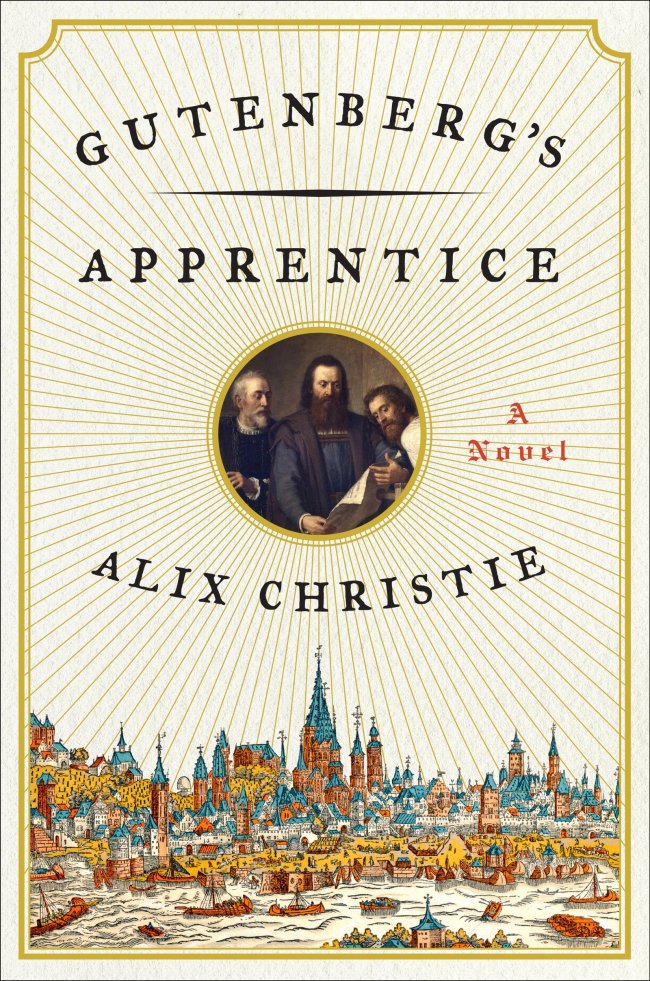‘Gutenberg’s Apprentice’ tells story of how printed Bible came to be
By Korea HeraldPublished : Nov. 20, 2014 - 20:54
The world is about to change.
Europe in 1450 is a godly place, and books are sacred and scarce. Each is hand-lettered by a scribe, directed by the hand of the Almighty.
In Alix Christie’s telling of how Johann Gutenberg’s revolutionary printed Bible took form, overcoming the idea of a mechanically produced holy book is a serious concern. Peter Schoeffer, a young scribe who is the apprentice of the book’s title, views the idea as the work of the devil.
Schoeffer, an actual historical figure who was one of the three men responsible for bringing the book from vision to reality, has, in Christie’s imagining, some serious soul searching to do. Printing (gasp!) a Bible (gasp!) is clearly sacrilegious, and he wants no part of it. But as the adopted son of Johann Fust, the wealthy Mainz merchant who’s underwriting the project, he is obligated.
Eventually he comes to believe that the hand of God is manifest in this project. He convinces himself (or does God convince him?) that there is artistry in the designing of typefaces, in the maddening process of producing metal and developing ink able to withstand the abuse of Gutenberg’s primitive press. (Convincing his God-fearing fiancee proves more problematic.)
Europe in 1450 is a godly place, and books are sacred and scarce. Each is hand-lettered by a scribe, directed by the hand of the Almighty.
In Alix Christie’s telling of how Johann Gutenberg’s revolutionary printed Bible took form, overcoming the idea of a mechanically produced holy book is a serious concern. Peter Schoeffer, a young scribe who is the apprentice of the book’s title, views the idea as the work of the devil.
Schoeffer, an actual historical figure who was one of the three men responsible for bringing the book from vision to reality, has, in Christie’s imagining, some serious soul searching to do. Printing (gasp!) a Bible (gasp!) is clearly sacrilegious, and he wants no part of it. But as the adopted son of Johann Fust, the wealthy Mainz merchant who’s underwriting the project, he is obligated.
Eventually he comes to believe that the hand of God is manifest in this project. He convinces himself (or does God convince him?) that there is artistry in the designing of typefaces, in the maddening process of producing metal and developing ink able to withstand the abuse of Gutenberg’s primitive press. (Convincing his God-fearing fiancee proves more problematic.)

For Gutenberg, it’s not about divine inspiration; it’s about money, and recognition. As Christie tells it, the man is a secretive, scheming, mercurial, manipulative, two-faced hustler ― hardly a person whose invention would rock the foundations of society. But Gutenberg simply sees himself as a pragmatist. He insists on utter secrecy for the years it takes to bring his Bible to reality ― from everyone but himself. He demands scrupulous honesty ― from everyone but himself. He demands utter loyalty, but undertakes printing contracts for papal indulgences without telling anyone on his crew, save one.
To Peter, this jeopardizes the divinely inspired mission. To Gutenberg, it’s a feint that keeps prying, greedy ecclesiastical eyes diverted from his true objective.
Meanwhile, Fust sees himself being bled dry by Gutenberg, and tension with the free-spending inventor ― who can never account for where the money is going ― builds to the point of threatening the project. Peter, loyal to both but at odds with each, is squeezed in the middle. This Peter is hardly a rock, but in historical fact, upon him the foundation of the printing industry was eventually built.
Christie has a huge task in immersing us in the tumultuous 15th century. The powers in Mainz were struggling to shed the corrupt, coffer-draining yoke of the church; the guilds were chafing against the city’s elders; Christianity was rocked to its core as Constantinople fell to Muslim attackers and talk of another Crusade circulated. (The parallel with what’s happening with the Islamic State and the West’s response is chilling.) There’s much history for the reader to absorb, and at times it’s too much. The head swims.
Perhaps because the task is so overwhelming, Christie’s writing never leaps off the page. I never got swept along by her prose as I longed to be. Still, she tries hard, and her writing is unobtrusive (except in the more intimate passages, which seem taken from the playbook of the pulp romance writers).
I also wished for greater depth of character. Not that Peter isn’t introspective, or that we’re unaware of the complexity of Gutenberg. But perhaps Christie has come at the characters a bit too head-on, telling rather than showing.
Printing, of course, did revolutionize the world, spreading knowledge more broadly than anyone could have imagined ― and making legions of scribes obsolete. It’s eerie that another such revolution is happening as I write this. Newspapers and network TV have been blindsided by the Internet. These once-mighty industries have been brought to their knees in less than a generation. The imprint of the press is history; the fate of newspapers and TV is still being tapped into our iPads.
By Christopher Wienandt
(The Dallas Morning News)
(MCT Information Services)
-
Articles by Korea Herald












![[Today’s K-pop] BTS pop-up event to come to Seoul](http://res.heraldm.com/phpwas/restmb_idxmake.php?idx=644&simg=/content/image/2024/04/17/20240417050734_0.jpg&u=)





![[KH Explains] Hyundai's full hybrid edge to pay off amid slow transition to pure EVs](http://res.heraldm.com/phpwas/restmb_idxmake.php?idx=652&simg=/content/image/2024/04/18/20240418050645_0.jpg&u=20240418181020)

![[Today’s K-pop] Zico drops snippet of collaboration with Jennie](http://res.heraldm.com/phpwas/restmb_idxmake.php?idx=642&simg=/content/image/2024/04/18/20240418050702_0.jpg&u=)